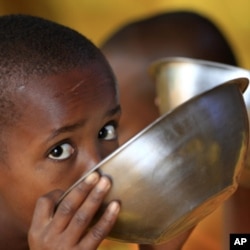A doctor working with Somali refugees in Kenya says she is seeing large numbers of Somali refugees coming in every day in need of immediate healthcare. Dr. Milhia Kader, health team leader for the International Rescue Committee, (IRC), at the Hagadera camp in Dadaab says the IRC has services at the reception center at the camp, where all new arrivals go for medical and nutritional evaluations. She said the biggest concern is with children less than five years of age.
“Most of them are presenting with malnutrition. They are emaciated. Some of them are so sick that we have to refer them to our inpatient facility immediately upon seeing them,” said Kader.
She said the camps are over stretched, bursting at their seams.
“We are now having refugees living in the outskirts of the camps where access to water, sanitation is difficult, and there are inadequate social amenities for them in these areas,” said Kader.
For mothers who have just given birth or who are pregnant, it is especially difficult because they have been travelling in most cases up to 45 days with no food, resulting in doctors at the camps seeing high levels of low birth rates.
“Mothers are also coming in very anemic, with very low blood levels. That not only has an effect on the risk of death to a mother when she is having the baby, but also there is a risk of the baby having anemia after delivery,” said Kader.
Another high risk is infection for the baby and the mother. In many cases, the mother has delivered the baby while on her journey to the camp or in the outskirts of the camp sites with no medical assistance.
To reduce this risk Kader says breastfeeding is strongly encouraged.
“For newborn children, we encourage breastfeeding. But for children who have malnutrition, apart from encouraging breastfeeding, for children under three years of age, we are providing high calorie, rich milk. This is to help them catch up before we switch them to therapeutic food,” explained Kader.
She said one of the therapeutic foods that is very beneficial is PlumpyNut because it has a high caloric content.
“When given to these children between six to eight weeks, they are able to gain weight to almost normal levels in a short period of time,” said Kader.




